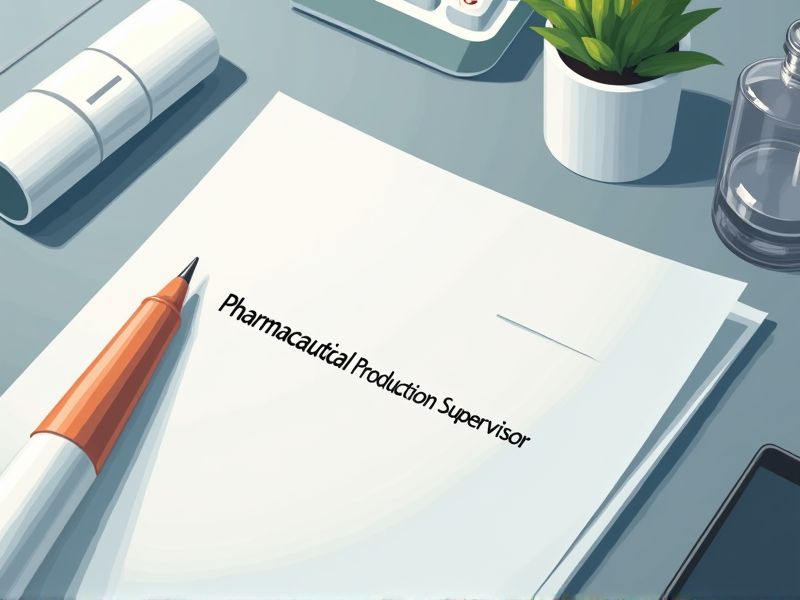
Pharmaceutical production supervisors oversee complex manufacturing processes, necessitating a profound understanding of industry regulations and safety standards. Certifications ensure that supervisors possess the necessary knowledge to manage compliance with Good Manufacturing Practices (GMP) and other critical protocols. These credentials validate a supervisor's expertise in quality assurance, risk management, and process optimization, directly impacting product safety and efficacy. Listed below are key certifications beneficial for a Pharmaceutical Production Supervisor.
Certified Pharmaceutical GMP Professional
A Certified Pharmaceutical GMP Professional ensures that pharmaceutical production processes comply with Good Manufacturing Practices, which directly impacts product quality and patient safety. This certification equips supervisors with essential skills in quality assurance and risk management, crucial for maintaining regulatory compliance. Without expertise in GMP, production supervisors might overlook critical quality control measures, leading to potential recalls or regulatory actions. Certification also facilitates the implementation of best practices in manufacturing, improving operational efficiency and reducing waste.
FDA Regulatory Affairs Certification
The FDA Regulatory Affairs Certification enables a Pharmaceutical Production Supervisor to effectively navigate complex regulatory requirements, ensuring compliance and avoiding costly legal issues. With this certification, supervisors gain a comprehensive understanding of documentation and approval processes, essential for the timely release of pharmaceutical products. Knowledge gained through certification helps mitigate risks associated with manufacturing processes, directly impacting product safety and efficacy. Certification fosters credibility and trust, crucial for maintaining partnerships with regulatory bodies and stakeholders.
Lean Six Sigma Green Belt Certification
Lean Six Sigma Green Belt Certification equips a Pharmaceutical Production Supervisor with tools to optimize processes, leading to increased efficiency and reduced waste in manufacturing environments. This certification provides methodologies for identifying and mitigating risks, which enhances product quality and ensures regulatory compliance. With a structured approach to problem-solving, supervisors can drive continuous improvements in production workflows, minimizing errors and defects. The certification also develops leadership skills, enabling supervisors to effectively manage teams and foster a culture of quality and excellence in pharmaceutical production.
Lean Six Sigma Black Belt Certification
Lean Six Sigma Black Belt Certification equips pharmaceutical production supervisors with advanced problem-solving skills, leading to improved process efficiency and reduced errors in drug manufacturing. Enhanced knowledge in quality control ensures that supervisors can maintain compliance with stringent regulatory standards, thus minimizing the risk of costly regulatory actions. By implementing data-driven decision-making, production supervisors can optimize resource utilization, reducing waste and lowering operational costs. The certification empowers supervisors to lead cross-functional teams effectively, fostering a culture of continuous improvement and innovation within pharmaceutical operations.
Certified Quality Auditor (CQA)
A Certified Quality Auditor (CQA) ensures pharmaceutical production supervisors adhere to stringent quality control standards, minimizing the risk of product recalls. The CQA certification provides supervisors with the expertise to evaluate and improve manufacturing processes, enhancing overall efficiency. Through rigorous audits, a CQA identifies potential compliance issues earlier, reducing potential regulatory violations. Having a CQA in pharmaceutical production demonstrates a commitment to maintaining high standards, fostering trust with consumers and regulatory bodies.
Certified Quality Engineer (CQE)
A Certified Quality Engineer (CQE) brings specialized expertise in quality systems, which is crucial for ensuring pharmaceutical products meet rigorous safety and efficacy standards. Their analytical skills help in identifying process improvements, reducing waste, and enhancing overall efficiency in production. Knowledge of regulatory requirements, such as FDA guidelines, allows CQEs to guide compliance and avoid costly legal issues. Data-driven decision-making by CQEs contributes to maintaining consistent product quality, ultimately protecting consumer health.
Project Management Professional (PMP)
Pharmaceutical production supervisors face complex regulatory requirements, and PMP certification equips them with essential project management skills to ensure compliance. Rigorous planning and resource allocation through PMP methodologies can enhance the efficiency and cost-effectiveness of drug manufacturing processes. The certification helps in risk management, a critical aspect in pharmaceuticals where production errors can have serious consequences. Effective project management can foster better communication and collaboration across teams, crucial for maintaining quality and meeting strict industry standards.
HACCP Certification
HACCP certification ensures that a Pharmaceutical Production Supervisor can systematically identify and control potential hazards in drug manufacturing processes, enhancing product safety. This certification aligns supervisors with industry standards and regulatory expectations, reducing the risk of product recalls and associated liabilities. It equips supervisors with the knowledge to implement effective quality control measures, ensuring compliance with Good Manufacturing Practices (GMP). Validating skills in hazard analysis strengthens the credibility and reliability of the production team, fostering trust with consumers and regulatory bodies.
Certified Manager of Quality/Organizational Excellence (CMQ/OE)
The CMQ/OE certification equips a Pharmaceutical Production Supervisor with the skills necessary to implement effective quality management practices, directly impacting product safety and efficacy. Enhanced quality management processes lead to reduced production errors, which in turn minimizes costly recalls and ensures compliance with stringent industry regulations. Supervisors with this certification can foster a culture of continuous improvement, driving operational excellence and increasing the efficiency of production lines. Knowledge from CMQ/OE also aids in strategic planning and effective resource management, which crucially supports the goal of maintaining high standards in a competitive market.
OSHA Occupational Safety Certification
Obtaining OSHA Occupational Safety Certification for a Pharmaceutical Production Supervisor ensures compliance with safety regulations, directly reducing workplace accidents. Proper training fosters a safer production environment, enhancing operational efficiency. Knowledge of OSHA standards helps supervisors effectively implement safety protocols, minimizing legal liabilities. Certified supervisors demonstrate a commitment to safety, improving worker morale and productivity.
Summary
By obtaining certifications, you can enhance your expertise and credibility in pharmaceutical production. This often leads to increased responsibilities and potentially higher salary. Certified supervisors tend to have improved problem-solving skills and understanding of compliance regulations. The organization may experience better efficiency and reduced errors in production processes.
